Sales Qualified Leads: How to Find and Convert SQLs
Casey O'Connor
A sales qualified lead (SQL) is a lead that has been researched, vetted, and qualified as highly likely to convert.
Sales qualified leads are important because they help salespeople prioritize how to best use their resources. They allow sales reps to focus on deals that are most likely to close.
In this article, we’ll go over everything you need to know about SQLs, including how to define them, why they’re important, and how they differ from other types of leads.
Here’s what we’ll cover:
- What Is a Sales Qualified Lead (SQL)?
- Why Do SQLs Matter?
SQL vs. MQL: Sales Qualified Lead vs. Marketing Qualified Lead - How Are SQLs Qualified?
- How to Find Sales Qualified Leads
- How to Convert Sales Qualified Leads
What Is a Sales Qualified Lead (SQL)?
A sales qualified lead (SQL) is a lead that has expressed interest in buying your product and has been vetted by your sales and marketing teams as being a good fit for your offer.
Sales qualified leads are identified through both demographic information — like how closely they match your ICP and buyer personas — and behavioral attributes, like how long they spend on your website or whether they download any content. 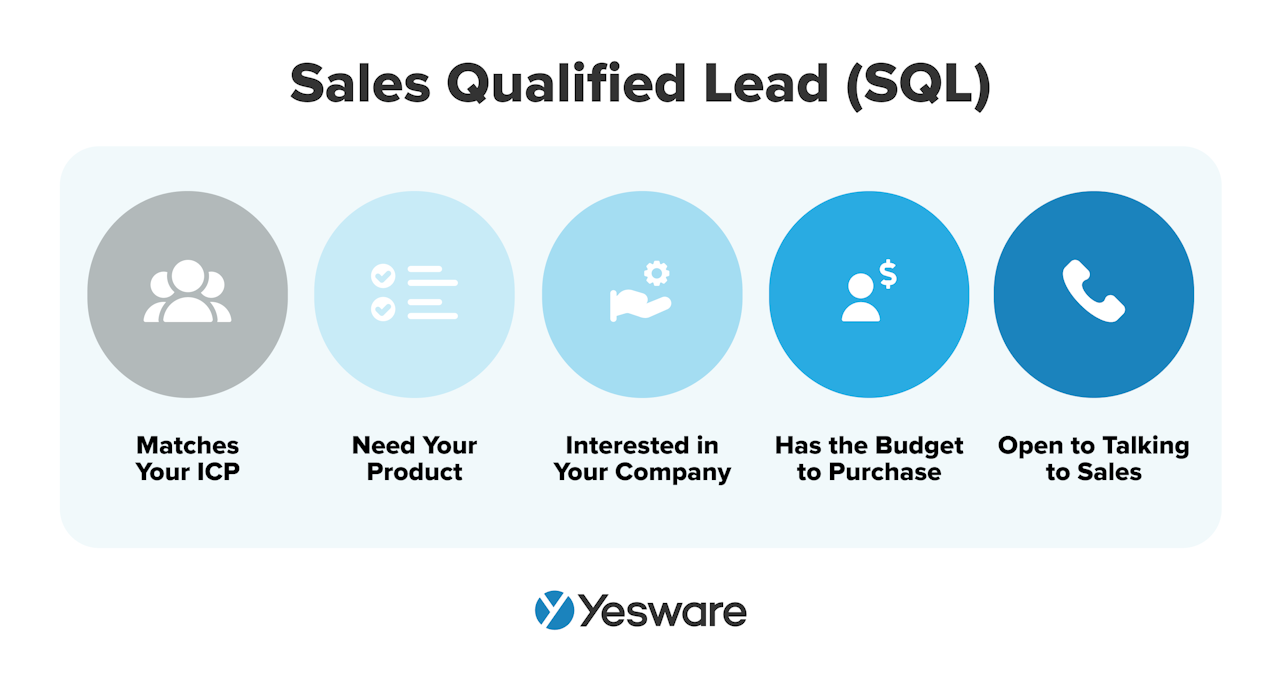 The process of identifying sales qualified leads helps salespeople know how to prioritize their time and energy in the sales process.
The process of identifying sales qualified leads helps salespeople know how to prioritize their time and energy in the sales process.
Not every lead is an easy sell; SQLs are specifically determined to be highly likely to convert, meaning that sales and marketing resources are being used productively when they’re devoted to this group of prospects.
One thing that sets SQLs apart from other leads is that they will generally welcome input or consultation from the sales team. Other types of leads, like sales accepted leads (SALs) and marketing qualified leads (MQL) may be less inclined to meet with a sales rep before other parts of their buyer’s journey are complete. 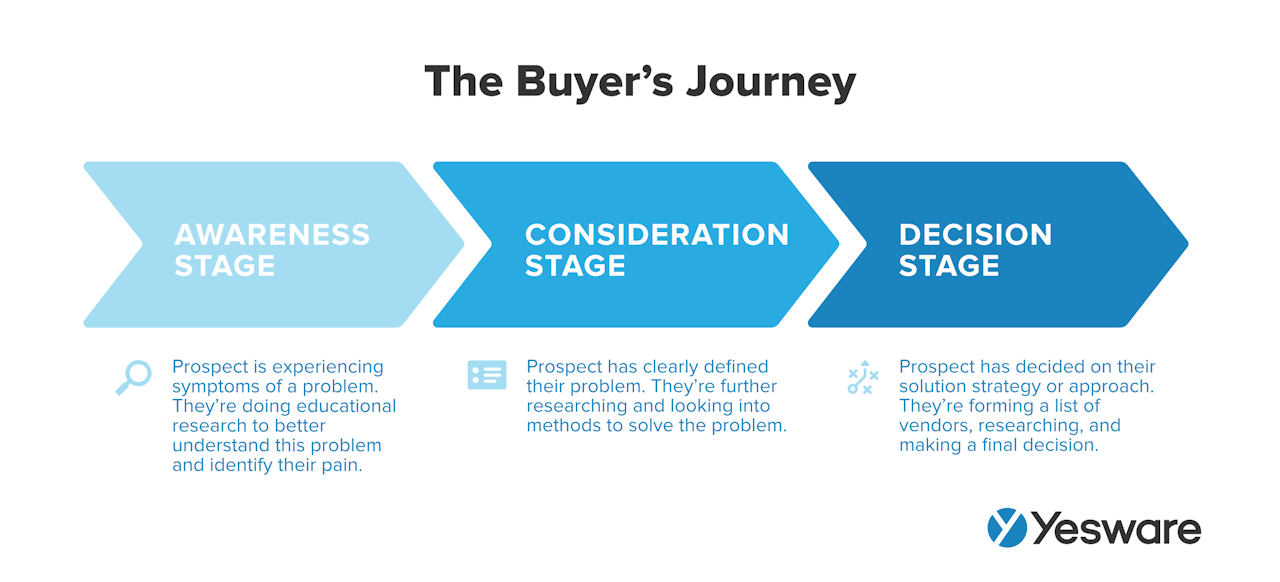 The criteria that determine what constitutes an SQL will vary by industry and company, but most SQLs have three primary elements in common:
The criteria that determine what constitutes an SQL will vary by industry and company, but most SQLs have three primary elements in common:
- They have a need for your product.
- They’ve shown interest in your company.
- They have the financial means to make the purchase.
After that, it’s up to sales and marketing to define what specifically signifies a high likelihood of purchasing within your target market.
Why do SQLs Matter?
Sales qualified leads might as well be gold for sales reps. They’re easy to work with because:
- They’re usually eager to talk to salespeople (or, at least, open to it)
- Their deals are relatively quick to close
- They typically go on to become very satisfied customers
SQLs are important parts of any healthy sales pipeline. They improve efficiency, increase transparency, and help optimize the sales process.
Improves Efficiency
Sales qualified leads help salespeople use their time efficiently. With SQLs, there’s less wasted time, and more time maximized talking to leads that are more likely to convert. The process of identifying SQLs also, in turn, helps sales reps better identify and nurture leads in other stages of the sales funnel.
Increases Transparency
Identifying SQLs also gives marketers and sales reps better insight into which of their campaigns and strategies are most effective.
Find out from SQLs-turned-customers about what drew them to your brand in the first place. What content was most valuable to them? What helped you stand out from the competition?
Learning more about what resonates with great-fit, motivated prospects will help you fine-tune your sales funnel.
Optimizes the Sales Process
Tracking your SQL close rate can provide an excellent checkup on the effectiveness of your overall sales process.
SQLs, in theory, should close more often than not. If that’s not the case, it’s a clear sign that sales and marketing need to go back to the drawing board and re-strategize.
SQL vs. MQL: Sales Qualified Lead vs. Marketing Qualified Lead
The main difference between a sales qualified lead and a marketing qualified lead is that a sales qualified lead is much readier to buy than a marketing qualified one.
Marketing qualified leads exist earlier in the sales funnel. They have the potential to become a customer, but need more time and nurturing before that likelihood increases. MQLs are typically aware of your product and have possibly even engaged with your brand, but are not yet ready to begin the sales process. 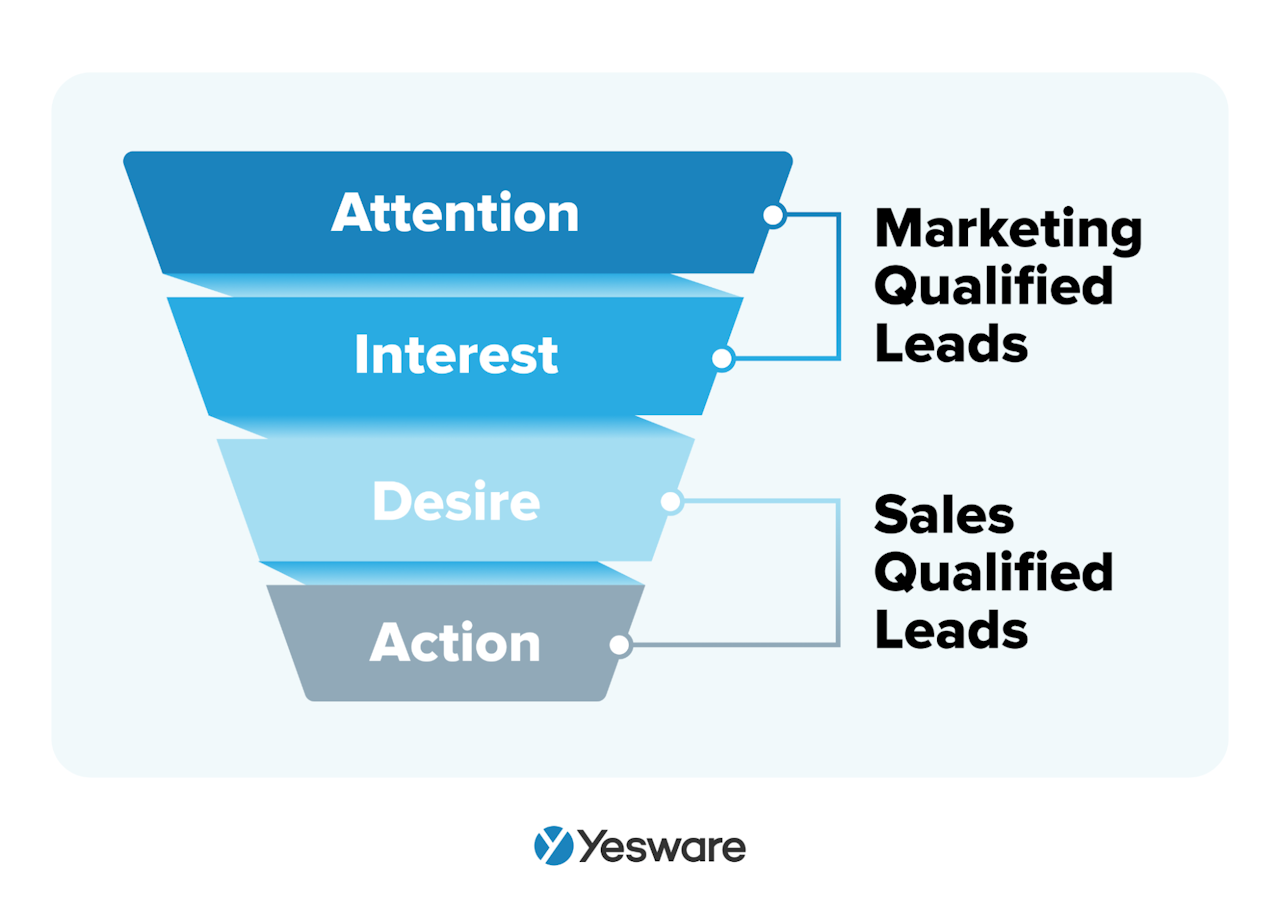 Sales reps usually encounter sales qualified leads later in the sales process.
Sales reps usually encounter sales qualified leads later in the sales process.
There are two main ways that sales and marketing teams can differentiate SQLs vs. MQLs: lead scoring and lead behavior.
Lead Scoring
Lead scoring is the process of assigning points for specific lead attributes and behavior markers in order to prioritize how and when salespeople interact with them. 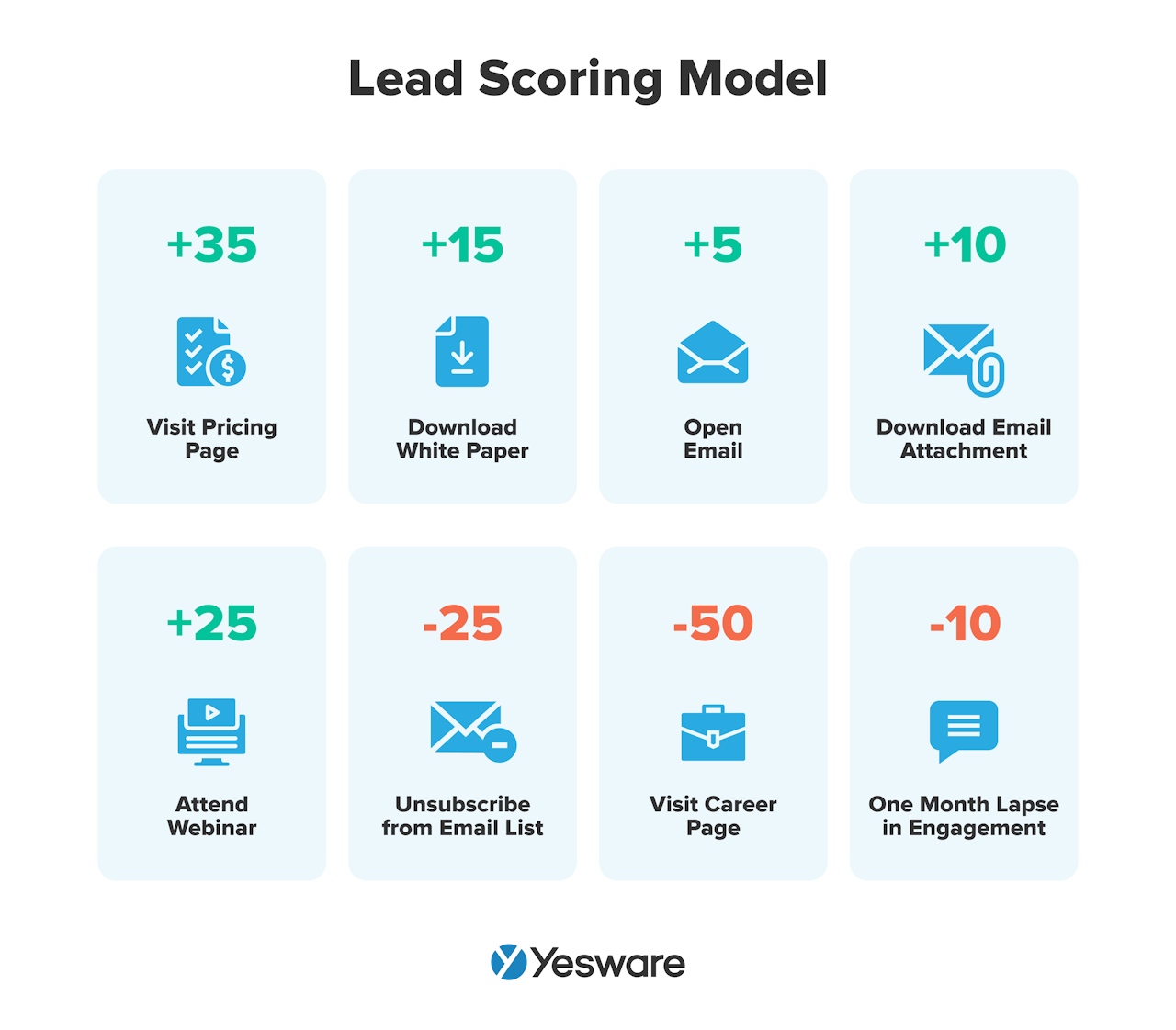 Lead scoring can be extremely helpful for salespeople in identifying SQLs vs. MQLs.
Lead scoring can be extremely helpful for salespeople in identifying SQLs vs. MQLs.
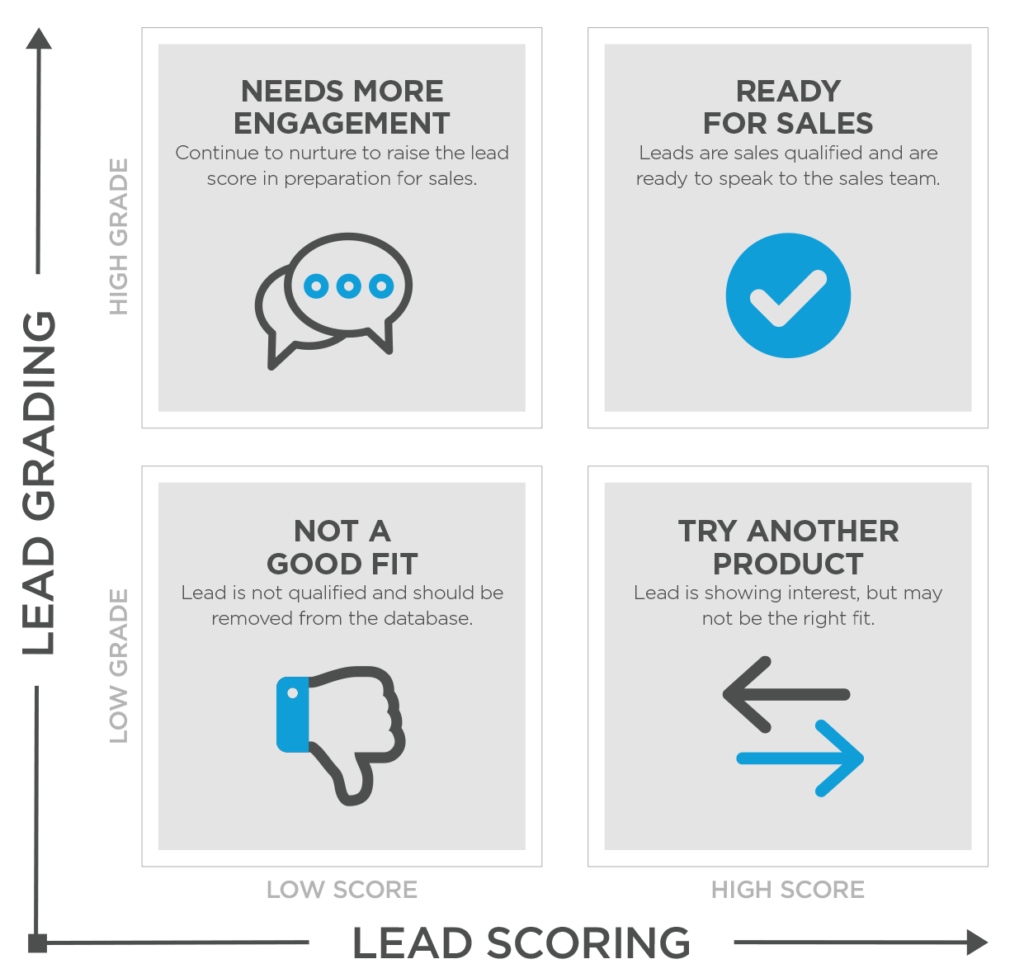
A matrix like the one shown above clearly outlines which leads are worth a sales rep’s time and energy, and which are better off being abandoned.
Lead Behavior
Another, less formalized way of determining SQLs vs. MQLs is to analyze lead behavior.
Sales and marketing should work together to compile a list of specific buyer behavior that has a high correlation with closing. They can then use those insights when qualifying leads to help them pinpoint which are most likely to become SQLs.
Studying lead behavior will also help sales reps understand how to best nurture MQLs at various points of the sales funnel.
Lead behavior that triggers MQL vs. SQL status will vary by company and ultimately depends on the prospect’s needs within their buyer’s journey. Some examples of lead behavior that sales and marketing teams consider are things like participating in a demo, downloading content, opening and/or responding to an email, or booking a meeting.
How Are SQLs Qualified?
The SQL qualification process needs to be very careful and thorough. If you’re too lax with your qualification standards, you could risk labeling unready leads as SQLs, which will skew your sales metrics and frustrate your reps.
With the exception of ensuring the process is fastidious, there are no other “right” ways to qualify SQLs. The exact framework or lead qualification process your team uses will depend on your company, your target market, and your offer.
Some sales teams opt for standard, prescribed qualification frameworks like BANT. Others use a more custom process that speaks more closely to their target market’s buyer’s journey.
Regardless of the method your team chooses to qualify SQLs, it’s important to remember the three main qualities all SQLs need to demonstrate in order to be considered sales-qualified:
- A need for your offer
- Interest in your company
- The budget to purchase
That being said, there are generally two basic schools of thought when it comes to qualifying SQLs: asking questions and scoring leads.
Asking Questions
Many sales teams choose to use a thorough questioning process to qualify their SQLs and other leads. This approach works particularly well with many SQLs; because they’ve already expressed interest in your company, they usually don’t mind when sales reps ask direct questions about their buying decision.
Some sales reps use a qualification framework to guide them through this process. BANT, for example, can help sales reps cut to the heart of what’s important in the buying process by uncovering information about a buyer’s budget, authority, need, and timeline.
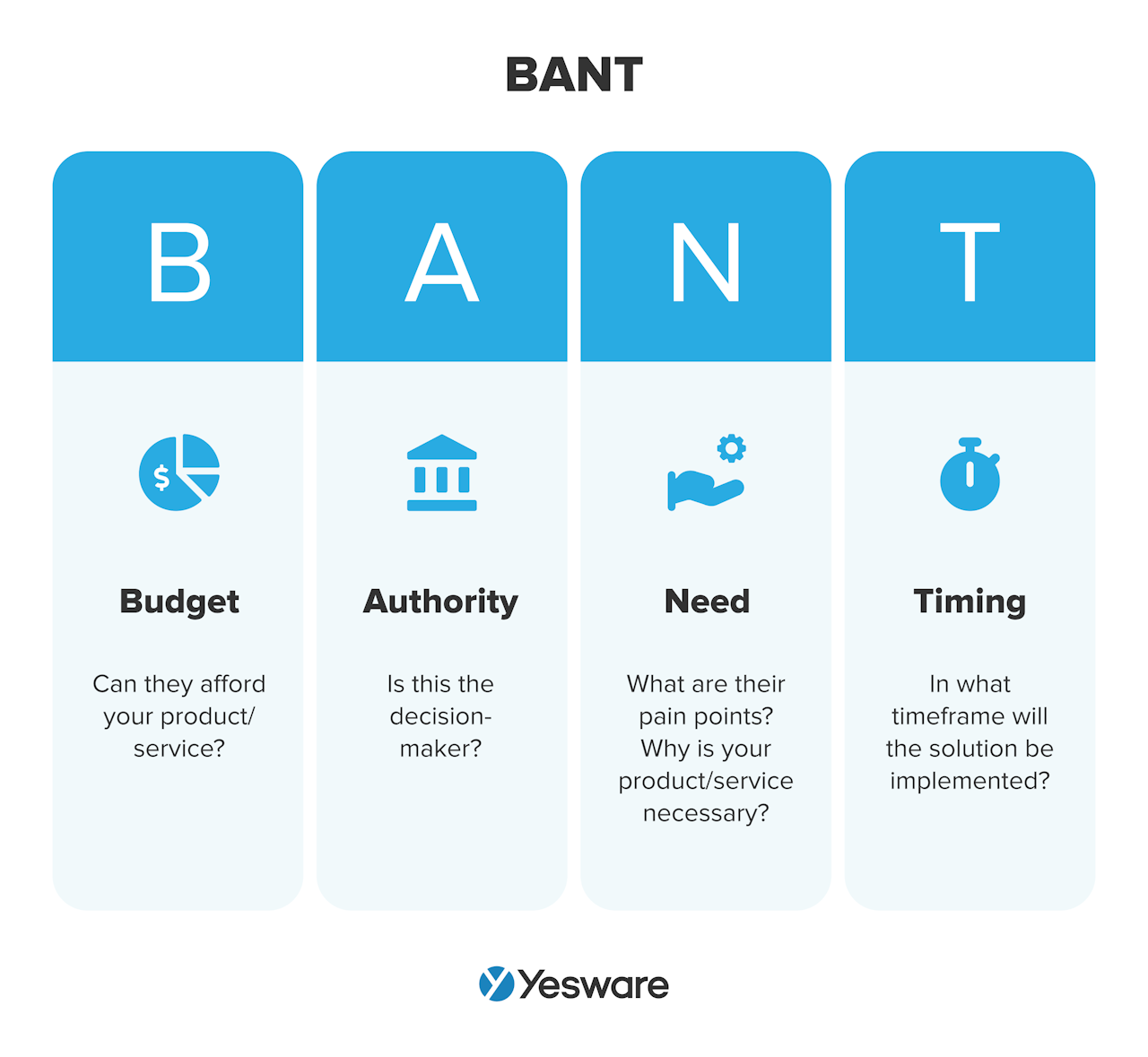 There are other frameworks that might be better suited for your particular team; MEDDIC, CHAMP, and ANUM are just a few other examples of qualification frameworks that can help your sales reps learn more about how ready prospects are to buy.
There are other frameworks that might be better suited for your particular team; MEDDIC, CHAMP, and ANUM are just a few other examples of qualification frameworks that can help your sales reps learn more about how ready prospects are to buy.
Regardless of the questions you ask, be sure to track their responses carefully. If possible, store them in your CRM or other centrally-located data hub. This will ensure your entire team stays on the same page about how to qualify leads, and which criteria qualifies an SQL.
Lead Scoring
Some companies choose to take a more structured approach when determining SQLs. Lead scoring offers a very objective qualification process for sales reps.
In a lead scoring model, leads are assigned or deducted points based on certain demographic criteria, as well as behavioral attributes that strongly indicate what kind of buyer they are.
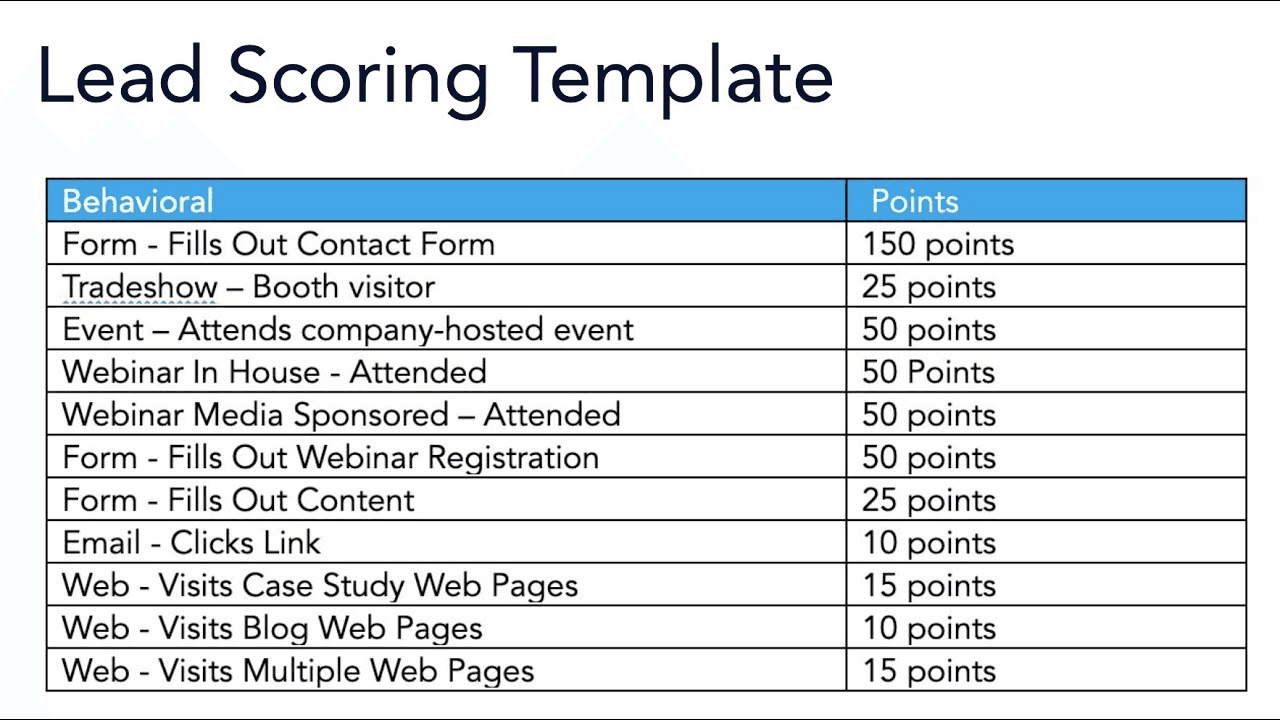
Lead scoring usually doesn’t require any interaction with prospects. Leads can be scored based on their industry, their job title, and their level of experience. Their overall company attributes will also contribute to their score — things like company size and revenue need to match the ICP pretty closely in order to earn significant points.
Demographic and behavioral attributes create a score that helps sales reps determine how to approach leads.
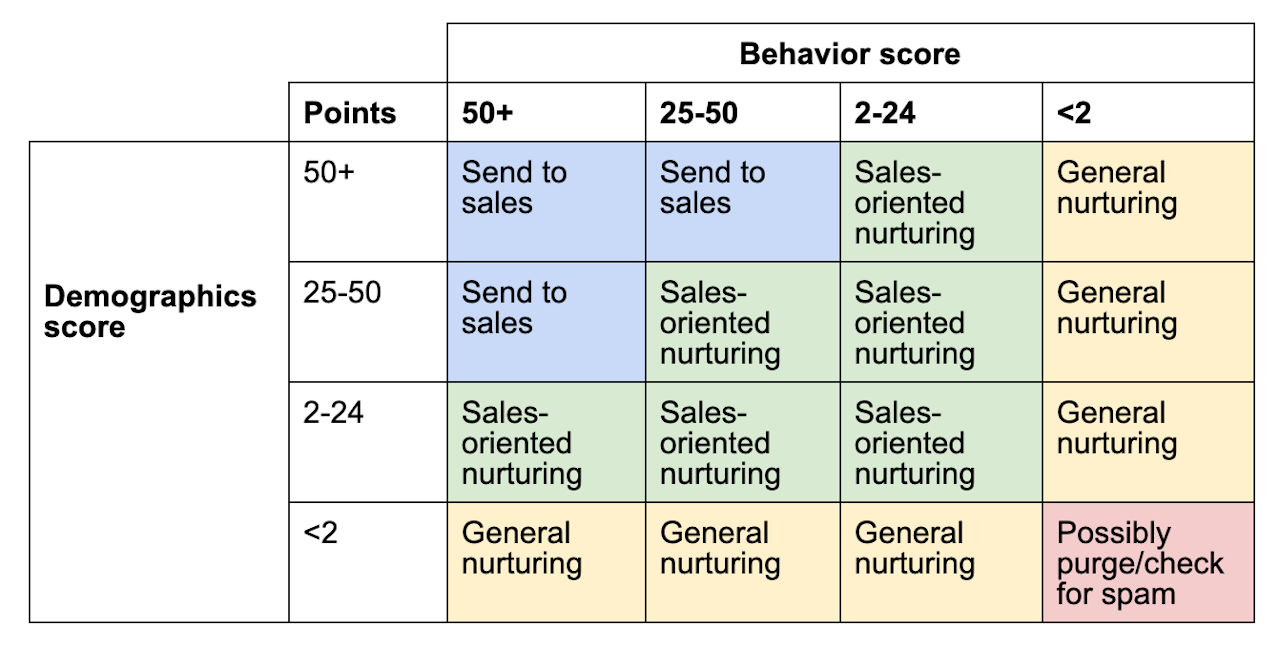
Leads with high points for both demographics and behavior are typically classified as SQLs and can be sent directly to sales.
Tip: Organize all your prospect research in one place with the template below.
 Free Template for Your Prospect ResearchThis customizable template will help you organize all prospect research in one place so you can quickly personalize outreach.
Free Template for Your Prospect ResearchThis customizable template will help you organize all prospect research in one place so you can quickly personalize outreach.
How to Find Sales Qualified Leads
Attracting sales qualified leads is all about quality, not quantity. The following steps will help you attract more sales qualified leads and fill your pipeline with promising sales opportunities.
1. Establish Buyer Personas
The first and most important part of identifying sales qualified leads is the development of your company’s ideal customer profile (ICP) and buyer personas. 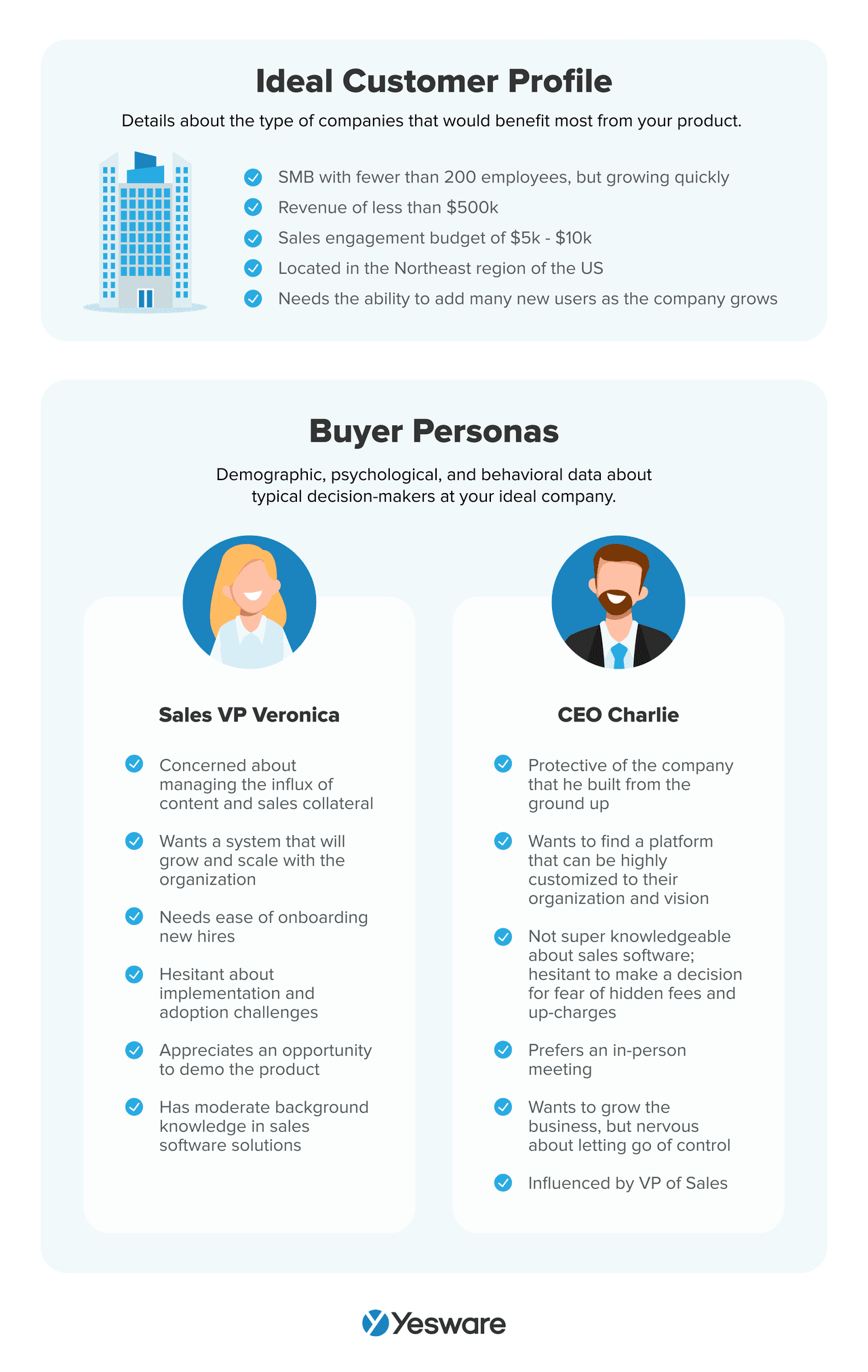 Sales qualified leads, by definition, are those that are most likely to benefit from your product. The foundational components of whether or not they’ll benefit are their demographics.
Sales qualified leads, by definition, are those that are most likely to benefit from your product. The foundational components of whether or not they’ll benefit are their demographics.
2. Make a Qualified Sales Lead List
Once you’ve ironed out the details of your ICP and the buyer personas you may encounter, use that data to start compiling a list of leads that fit those profiles. Research each of them carefully and try to pinpoint the ones that are the closest possible match to the ICP.
Remember that part of classifying an SQL is based on analyzing their behavior. But in the beginning stages, start the process by using demographic information to guide your process. You’ll learn more about the behavioral signals of buyer personas as you practice qualifying those with the right demographics.
Make sure you collect as much up-to-date contact information as you can for each company that matches your ICP. You’ll want to store their phone number, email, and job title, at the very least.
3. Create Content
Creating a tangible list of real companies to target can help your marketing and sales team develop the kind of content that will attract them to your brand. Use what you know about these prospects to develop ebooks, webinars, blog posts, case studies, and videos that highlight the features and benefits of your product.
The content you’ll make to attract SQLs will be different from the content that will nurture leads who are less ready to buy — keep that in mind. But your SQL content will help shape the tone and messaging of the content for the rest of the funnel.
4. Locate Unsatisfied Customers of Competitors
As you start to qualify leads with the right demographics, you might also consider doing some competitive analysis.
Depending on your market or industry, you may be able to identify leads who have signed on with your competitors. If you have the right resources and relationships, you might also be able to determine how happy they are with the competition. Social media and Google reviews can be very helpful in this process.
If you learn through the course of your research that a great-fit lead is not having their needs met by one of their competitors, practice your pitch and see if you can get them to sign on with you, instead. This approach can help you fine-tune your messaging around your unique selling points and customer success strategies.
5. Track and Analyze Prospect Behavior
As you practice qualifying sales-qualified leads, make sure you log careful notes about the process and, especially, lead behavior. Qualifying SQLs is as much art as it is science, and will require practice. Tracking progress and leads’ interactions will help sales reps improve the process over time.
How to Convert Sales Qualified Leads
Most sales qualified leads are looking for reasons to say yes to your offer. They have a problem, are eager to solve it, and have identified your product as a strong contender. Here are a few ways to tip the scales in your favor and convert sales qualified leads.
Response Speed
Research shows that the faster a sales rep responds to prospect outreach, the more likely they are to connect with and qualify that prospect.
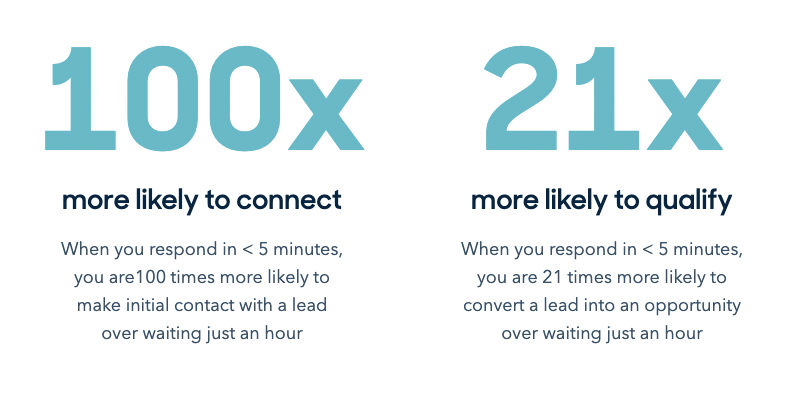
Buyers today have instant access to an abundance of information about you and your competitors’ organizations. That means that when they do reach out to a sales rep, they’re seriously interested in having a conversation with you. Follow up as quickly as possible to capitalize on that interest; if you don’t, your competitors certainly will.
Tip: How quickly should you contact inbound leads?
Persistence
It takes an average of 8 interactions before an SQL converts. Sales reps need to keep this in mind as they navigate the sales process — don’t abandon a great opportunity just because it doesn’t close after the first conversation.
A multichannel approach to outreach can help you stay on top of following up without seeming pushy. It also generates better response rates than campaigns with fewer channels.
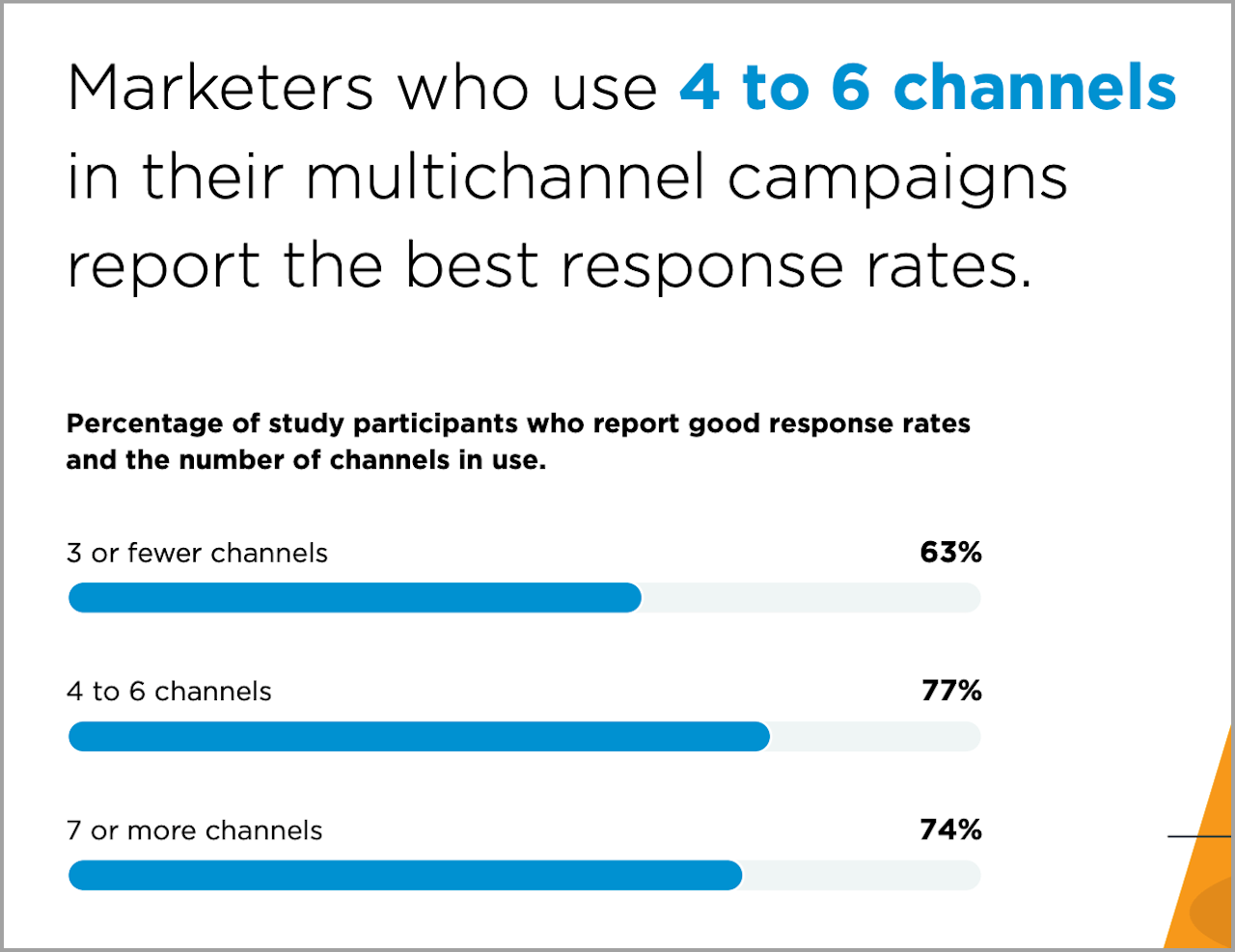
One of the most important things a salesperson can do is follow up.
Content Marketing
An effective content marketing campaign can help validate an SQL’s interest in your brand. Content like blog posts, whitepapers, email drip campaigns, and social selling can all work to nurture and educate prospects who hope to see you as an expert in the industry.
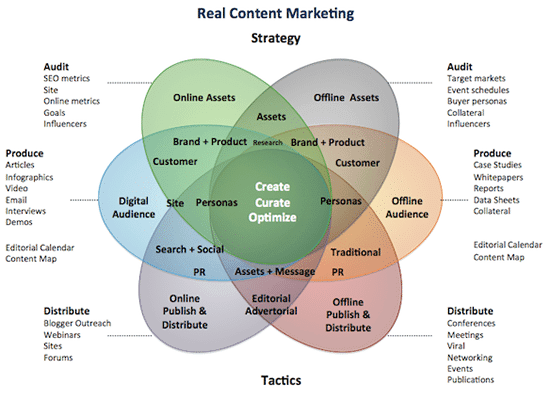
Content marketing strategies can range from extremely intricate (like the example in the image above) to simple and straightforward. Don’t get caught up thinking you need to touch all corners of the internet with your content; a few high-value, easily accessible pieces of content will go a long way in confirming an SQL’s positive impression of your business.
Tip: How to convert leads into sales.
Data-Driven Lead Management
Effective management of SQLs requires sales reps to leverage their CRM platforms effectively. All data points should be logged and, eventually, analyzed to determine which sales strategies and content/campaigns resonate most with great-fit leads.
Yesware’s email tracking and attachment tracking features empower sales reps to pull back the curtain on which content is most valuable to their target market.
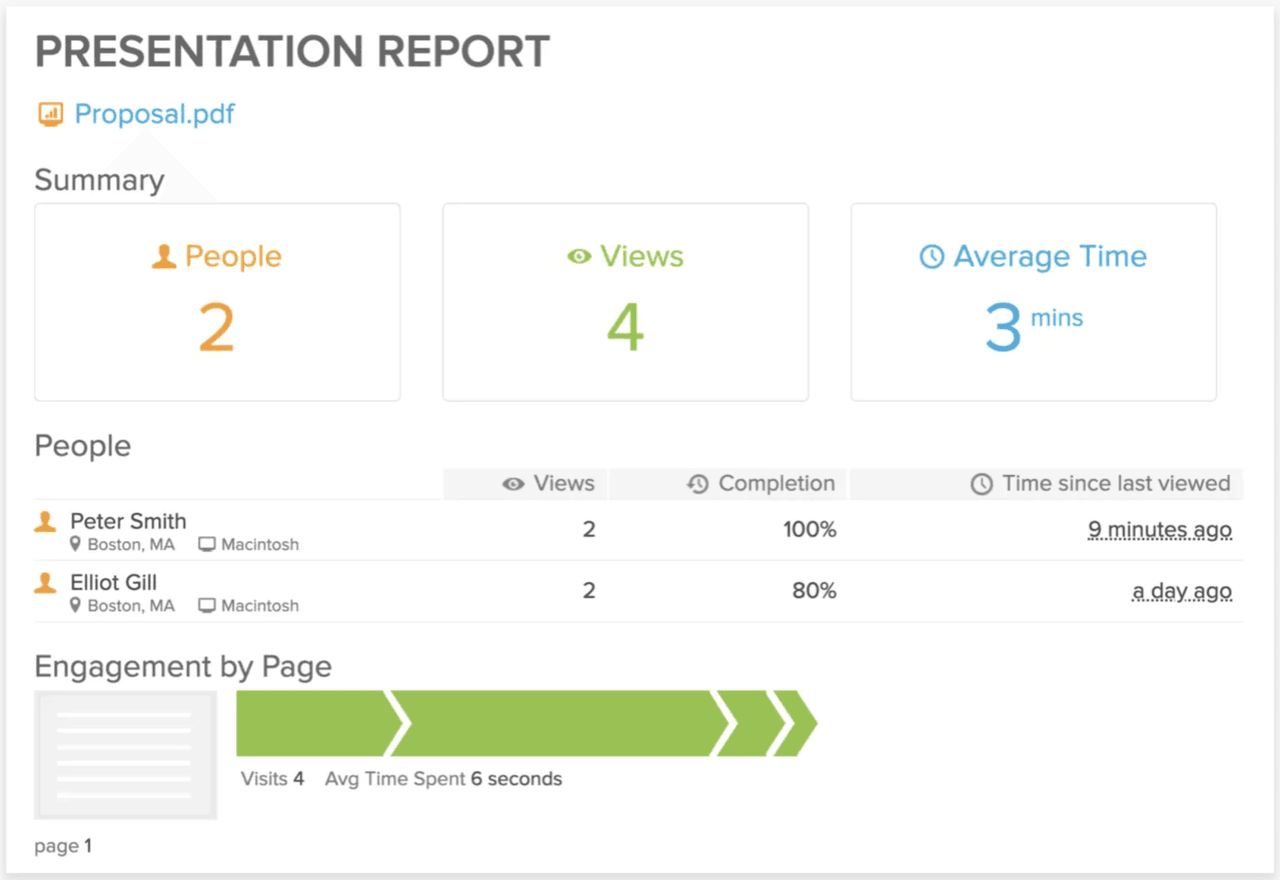
Yesware also helps sales reps track prospects’ engagement throughout the sales funnel. And, with seamless syncing and integration with Salesforce, the data you need is always right at your fingertips.
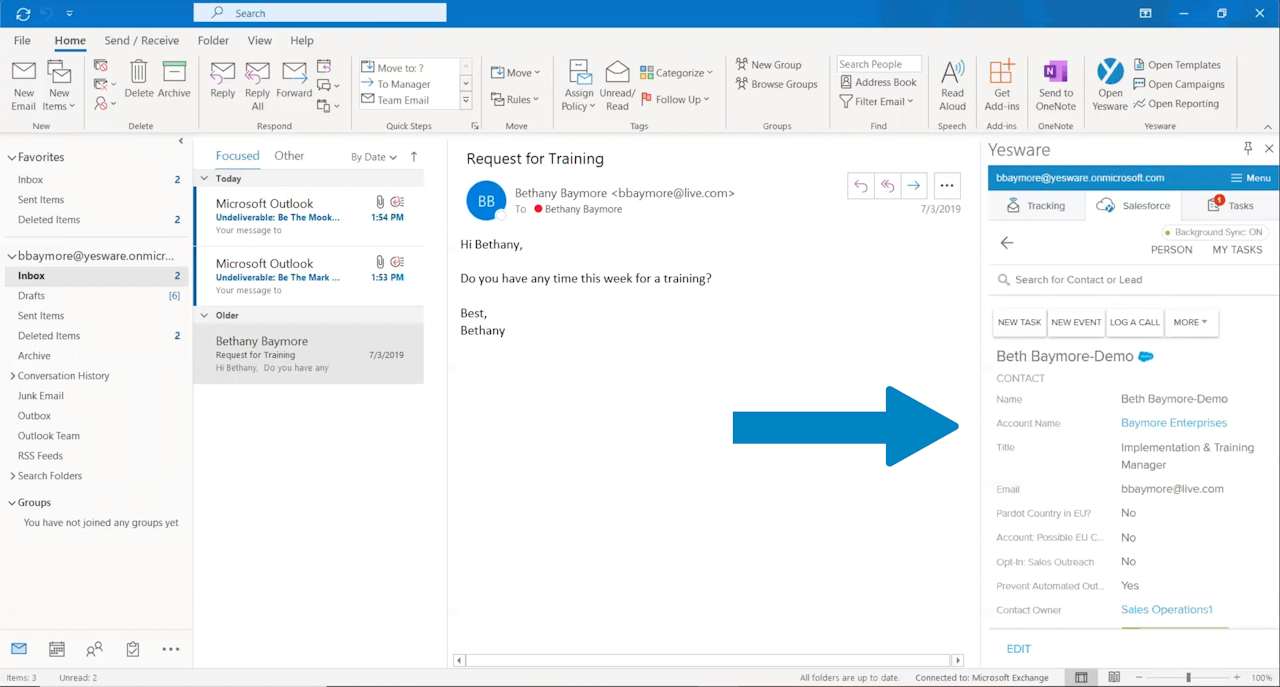
How does your team manage sales qualified leads? How do you differentiate them from other types of leads? Can you identify strategies that will help you improve your SQL close rate?
Get sales tips and strategies delivered straight to your inbox.
Yesware will help you generate more sales right from your inbox. Try our Outlook add-on or Gmail Chrome extension for free, forever!
Related Articles
Casey O'Connor
Casey O'Connor
Anya Vitko
Sales, deal management, and communication tips for your inbox

